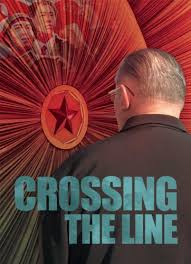
CROSSING THE LINE
UK, 2006, 86 minutes, Colour.
Narrated by Christian Slater.
Directed by Daniel Gordon, Nicholas Bonner.
While this documentary was made in the early 2000s, it continues to be interesting, especially because of the place of North Korea in world politics since the middle of the 20th century and its continued ambitions into the 21st century.
This is a British production, the directors interviewing James Dresnock, the American soldier who crossed the line from South Korea to North Korea in 1952 and stayed there for the rest of his life.
While the focus is on Dresdock and three other American soldiers, there is a great deal of background footage and explanations of Asia the end of World War II, the defeat of the Japanese, the Japanese in Korea, the links with North Korea and China and the newly emerging Communist Party under Mao Tse Tung. There are explanations of the Korean War, the American presence, the dislike of the Americans and their treatment of the North Koreans. There are explanations of the division between the North and South and the consequences.
There are a number of interviews with American officers from Korea at the time, those who had the defectors in their forces, background stories to what it happened, comments on the characters, opinions on their behaviour and the relationships between North Korea and the US, issues of propaganda.
Because North Korea can be so secretive, a film like this where the directors were able to be in the country and freely interview some of the defectors is significant. There are explanations, showing their lives over the decades, visuals of life in North Korea, cut off from the rest of the world, yet promoting English because of its access to technological developments, the regimentation, the vast crowds organised, the goose-stepping military…
But, the focus of attention, is on James Dresdock, willing to be interviewed 50 years after his defection. He gives an explanation of his difficult childhood, parents, orphanages, joining the military, service in Korea, working with other soldiers, the hard life of the soldiers, the drinking, the prostitutes, and his decision to cross the line to North Korea. There are some details of three other men who defected, two soon after Dresdock, one in the 1960s.
Dresdock is very affable in his interviews, smiling, giving explanations, his childhood, what it was like at his age to be in a foreign country, issues of language, culture, race, the treatment by the authorities, the indoctrination and his acceptance of this, then details of his marriages, his children, their American appearance yet their Korean mentality, their education, his role in giving lectures, and, perhaps surprisingly, the involvement of the defectors in the Korean film industry, propaganda films and their playing “ugly Americans”.
Some attention is given to the defector, Charles Robert Jenkins, his wife, a captured Japanese, his eventually leaving career to return to his wife and writing a book about his experiences.
There is a certain sympathy initially for James Desdock, his background, sad experiences, immaturity, and the consequences for living the rest of his life in North Korea. His doctor reveals he is in poor health, the smoking and the drinking. However, from the American point of view, he is a defector, a traitor, working for decades against America and its interests.